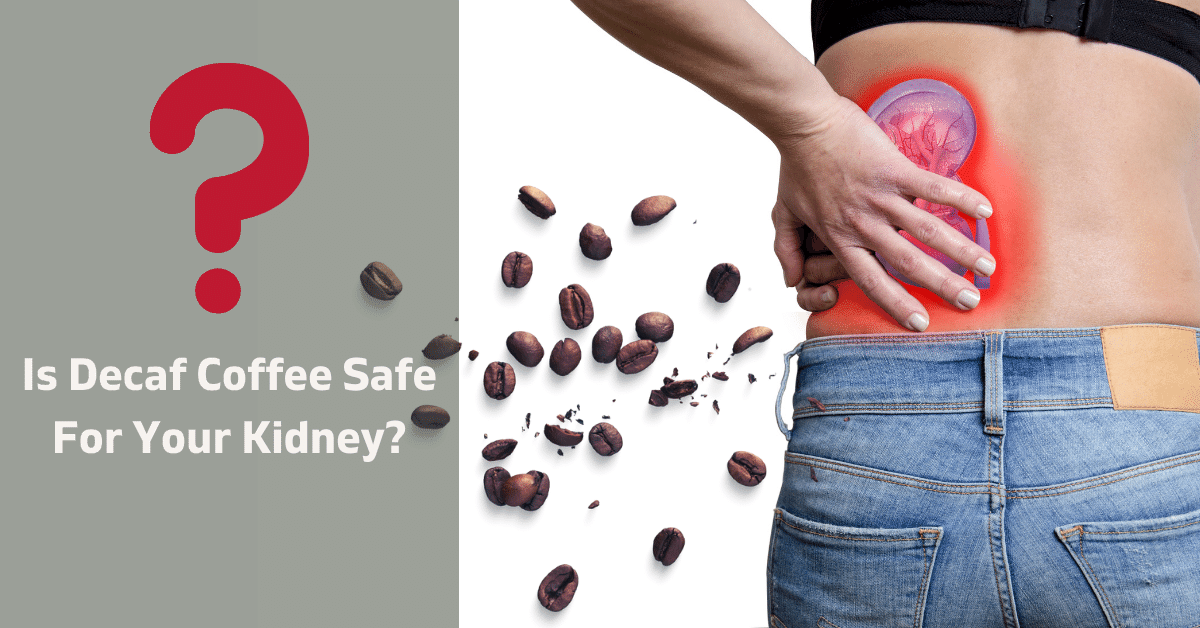You may be wondering if decaf coffee is safe for your kidney. The answer to that question is a little bit complicated. Decaf coffee contains potassium, which can raise your potassium levels if you have kidney disease or are at risk for kidney stones. However, depending on your situation, decaf coffee is not necessarily bad for your kidneys.
This blog post will discuss the potential risks and benefits of drinking decaf coffee to your kidney health. We will also provide tips on keeping your potassium levels in check, whether you drink decaf or regular coffee.
Quick navigation
- Does Decaf Coffee Have Potassium?
- How Does Potassium Affect Kidney Health?
- Is decaf coffee Safe for kidney disease?
- Is Consuming Decaf Coffee On A Renal Diet Acceptable?
- Should You Avoid Decaf Coffee If You Have Kidney Stones?
- Tips for Keeping Your Potassium Levels in Check
Does Decaf Coffee Have Potassium?
Decaf coffee does have potassium, which can be a concern if you have kidney disease or are at risk for developing kidney stones. The decaffeination process used to remove the caffeine from coffee beans can also affect the potassium content. For example, the Swiss Water Process decaffeinates coffee beans using water and no chemicals, which results in a coffee with a higher potassium content.
How Much Potassium in Decaf Coffee?
Decaf coffee contains 128 mg of potassium (source), slightly higher than the potassium in regular coffee, which has 116 mg per 1 cup (8 fl oz) (237 g). Furthermore, add-ons like milk and sweeteners can increase their overall value.
There are many benefits to drinking decaf coffee. Still, one of the downsides is that it might contain too much potassium for some people with higher potassium levels in the blood. Therefore it is recommended to go for regular coffee in such a scenario.
How Does Potassium Affect Kidney Health?
Potassium is a mineral essential for many functions in the body, including muscle contraction and heart function, and it is also necessary for proper kidney function. When the kidneys are not functioning correctly, potassium can build up in the blood and cause serious health problems.
People with kidney disease or those at risk for developing kidney stones should be cautious about their potassium intake. Suppose you have kidney disease or are at risk for developing kidney stones. In that case, you should talk to your doctor about how much potassium you should consume. You may need to limit potassium intake from all sources, including decaf coffee.
Is decaf coffee Safe for kidney disease?
Depending on the type of kidney disease, Consuming Regular or Decaf coffee in moderation (1 – 2 cups) should be acceptable for chronic kidney disease. Coffee should be avoided or limited by individuals with kidney stones due to the presence of oxalates.
Is Consuming Decaf Coffee On A Renal Diet Acceptable?
If you have kidney disease, you may be on a renal diet. This diet is designed to help people with kidney disease stay healthy and avoid further kidney damage. There are many renal diets, but most restrict the amount of potassium consumed.
While decaf coffee has potassium, it is generally considered safe for people on a renal diet. If you are on a renal diet and want to drink decaf coffee, talk to your doctor or dietitian first. They can help you determine how much decaf coffee is safe for you to consume based on your individual situation.
Should You Avoid Decaf Coffee If You Have Kidney Stones?
Kidney stones are a common condition that can cause severe pain. They are usually made up of calcium but can also be made up of other minerals, including potassium. People with kidney stones may need to avoid foods and drinks high in potassium, including decaf coffee.
However, A recent study suggests drinking coffee may help prevent kidney stones! They found that people who drink caffeine have a lower risk of developing painful kidney stones. The researchers believe it’s because the acids in dark roasted blends seem most beneficial.
Still, future studies should test different coffees and determine which ingredients are responsible for keeping your body safe from its symptoms. But, people who are already suffering from kidney stones or another renal disease must avoid high potassium foods, including decaf coffee, or at least should consult their healthcare provider regarding the safe amounts of decaf coffee for them.
Read also: Is Decaf Coffee Diuretic?
Tips for Keeping Your Potassium Levels in Check
You can do a few things to keep your potassium levels in check, whether you drink decaf or regular coffee.
- Drink plenty of fluids throughout the day to keep your kidneys flushed and functioning properly.
- Avoid adding milk or sweeteners to your coffee, as these can increase the potassium content.
- Limit your intake of other high-potassium foods, such as bananas, oranges, and potatoes.
- Talk to your doctor about how much potassium you should consume and whether you need to limit your decaf coffee intake.
- Follow proper medication and treatment for the removal of kidney stones.
- Take water pills or potassium binders, as advised by the doctor.
- Certain salt substitutes have a high potassium content. This is not good for people with kidney disease since it can lead to further complications and death.
Decaf coffee may not be the best choice for you if you have kidney disease or are at risk of kidney stones. However, decaf coffee can be a good option if you are healthy and just looking to cut back on your caffeine intake. Just stay hydrated and limit your intake of other high-potassium foods. And, as always, talk to your doctor if you have any concerns about your potassium intake.
That is all about this article. I hope you have found this article helpful and informative. Please feel free to ask in the comment section below if you have any further queries. Stay healthy and safe!

